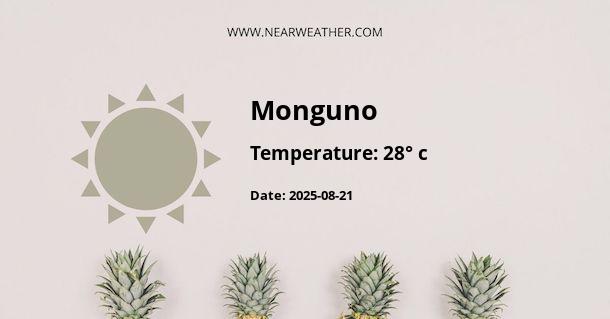Climate and Weather in Mongonu, Nigeria
Mongonu is a town located in the northeastern part of Nigeria. It belongs to the Borno State and lies in the Sahel region, which is characterized by a semi-arid climate. The town experiences distinct weather patterns throughout the year, with hot and dry conditions prevailing for most of the time. Understanding the climate and weather in Mongonu is important for residents, tourists, and businesses operating in the area.
Temperature
The temperature in Mongonu can be quite extreme, with hot summers and relatively cooler winters. The average annual temperature in the region is around 26 degrees Celsius (79 degrees Fahrenheit). During the summer months, which usually extends from April to October, temperatures can soar up to 40 degrees Celsius (104 degrees Fahrenheit) or even higher. It is important to note that heatwaves are not uncommon during this period.
During the winter months, from November to March, temperatures drop slightly, with average highs around 30 degrees Celsius (86 degrees Fahrenheit). However, nighttime temperatures can be significantly cooler, averaging around 15 degrees Celsius (59 degrees Fahrenheit).
Rainfall
Mongonu experiences a distinct wet and dry season, typical of the Sahel region. The rainy season usually occurs between May and September, with July and August being the peak months for rainfall. During this period, the town receives an average annual rainfall of about 400-600 millimeters (15.7-23.6 inches).
The dry season, on the other hand, extends from October to April, with minimal or no rainfall. This prolonged dry period contributes to the semi-arid nature of the region and can lead to drought conditions. It is important to note that rainfall patterns can vary from year to year, and the amount and timing of rainfall can have a significant impact on agricultural activities in the area.
Wind and Dust
Mongonu, like many other locations in the Sahel region, experiences strong winds, especially during the dry season. These winds can sometimes carry large amounts of dust, leading to reduced visibility and potentially causing respiratory problems. Dust storms are more common during the harmattan season, which occurs from November to February. During this period, dry and dusty winds blow from the Sahara Desert, affecting many parts of West Africa.
Climate Change and Adaptation
Climate change is a global issue that affects regions all over the world, including Mongonu. The Sahel region has been experiencing changes in rainfall patterns and increased temperatures over the years. These changes can have significant implications for agriculture, water availability, and overall livelihoods in the area.
Adapting to these changes is crucial for the sustainability and resilience of the community. This can include implementing water management strategies, adopting climate-smart agricultural practices, and investing in renewable energy sources. Local and national governments, along with international organizations, are working together to support communities in adapting to the impacts of climate change.
Conclusion
Mongonu, Nigeria, experiences a semi-arid climate with hot and dry conditions for most of the year. The town has distinct wet and dry seasons, with the rainy season occurring between May and September. Understanding the climate and weather patterns in Mongonu is crucial for residents, businesses, and policymakers in order to plan and adapt to the changing climate conditions. By implementing appropriate adaptation strategies, the community can mitigate the impacts of climate change and ensure a sustainable future.
A - Monguno's Latitude is 12.678630 & Longitude is 13.607920.
A - Weather in Monguno is 27° today.
A - Climate Conditions in Monguno shows overcast clouds today.
A - Humidity in Monguno is 19% today.
A - Wind speed in Monguno is 12.49 km/h, flowing at 358° wind direction. today.
